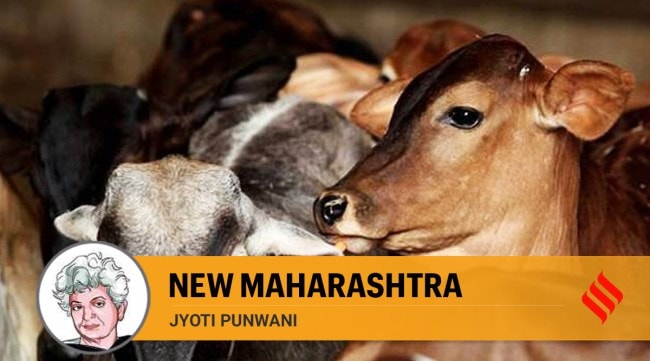Opinion A new Maharashtra of gau rakshaks
While those transporting cattle has been attacked before, lynchings are new
 Barely two days after the second lynching, the Maharashtra Assembly Speaker issued a directive to the police to ensure that ‘gau rakshaks’ were not booked on ‘false charges’, and to file FIRs against those threatening or attacking them.
Barely two days after the second lynching, the Maharashtra Assembly Speaker issued a directive to the police to ensure that ‘gau rakshaks’ were not booked on ‘false charges’, and to file FIRs against those threatening or attacking them. Exactly a year after the Devendra Fadnavis-Eknath Shinde government took over, the state witnessed two lynchings by so-called gau-rakshaks. Even Mumbai was singed. Though the lynchings took place far from the country’s financial capital, two of the victims belonged to Mumbai.
Incidentally, the two victims and the survivor are Pasmandas, the very category the PM spoke so feelingly about in Bhopal as he launched his 2024 campaign. In April, another Pasmanda was forced to bow before a cow and beg forgiveness for his “sin’’ of transporting cattle. Yet, no BJP “outreach’’ is as yet visible towards the victims.
Even under the Congress-NCP governments, Hindutva groups have been accused of assaulting and extorting money from Muslims transporting cattle for Bakri Eid. But lynching is new. Interestingly, when lynchings were making news in other BJP-ruled states between 2016-18, Maharashtra remained untouched.
Today too, the ruling parties are the same as they were then, as is the man that the police report to, Home Minister Devendra Fadnavis, an RSS-ABVP product. So what’s changed?
One noticeable change since November is the high visibility of Hindutva groups. The lack of action on their poisonous speeches against Muslims provoked the Supreme Court to describe the Fadnavis government as “impotent’’. Cow vigilantes seem to feel emboldened under the new government, evident from the way they struck twice in a fortnight in the same area.
However, it would be dishonest not to acknowledge that the way police have handled these cases is vastly different from what we’ve seen in other BJP-ruled states. Not only have 20 cow vigilantes been arrested for the two lynchings and charged with murder, but four policemen have also been suspended for their lackadaisical response. After all, Bakri Eid was just round the corner, how could they not have been more alert? Incidentally, punishment for police failure to prevent such incidents was recommended by the Supreme Court in its 2018 guidelines to states on dealing with mob lynching.
It’s a sign of the times that we feel grateful to the police for simply doing their job in a professional manner. Now, whether they will pursue the case till conviction depends on the government. Will Fadnavis instruct them to oppose bail? Will he obey the Supreme Court and set up Special/Fast Track courts to try these cases? Will he at least appoint special public prosecutors who can focus on these cases, or will these end up as just two more in the pile of cases that the regular overworked and underpaid public prosecutors have to deal with?
However, the police still need to answer a few questions. They claim to be aware of the vigilantes’ networks. Has the toll plaza employee who alerted those involved in the second lynching been charged? A bigger question mark is on their decision to book the victims. Since the forensic report of the meat seized has not come in, they cannot charge the victims under Maharashtra’s Animal Preservation Act (2015). However, instead of waiting for the report, they’ve charged them with the Prevention of Cruelty to Animals Act. But no animal was being transported, only meat. Finally, though police investigations reveal that the victim in the first lynching was killed because he didn’t cough up money, extortion charges haven’t been invoked.
Barely two days after the second lynching, the Maharashtra Assembly Speaker issued a directive to the police to ensure that “gau rakshaks’’ were not booked on “false charges’’, and to file FIRs against those threatening or attacking them. But this had already been done after an alleged gau rakshak was killed in a clash with suspected cattle transporters earlier this month; five policemen were also suspended. So what did such a directive achieve? Incidentally, does the Speaker have the authority to issue orders to the police?
In Qureshi Nagar, home to both victims of the second lynching, it was business as usual two days after the incident. A question about whether the NCP’s corporator Kaptan Malik had visited drew cynical laughs. Muslim leaders of the Congress and Samajwadi Party did visit the families; the Congress has demanded compensation and an SIT.
As always, it will fall on Mumbai’s human rights activists to ensure justice for their fellow citizens by pursuing these cases to the end. After all, if those who lynched Tabrez Ansari in Jharkhand in 2019 could be convicted now, why should Mumbai’s Afaan Ansari and Nasir Shaikh, and Bhiwandi’s Lukman Ansari not get justice?
The writer is a senior journalist




